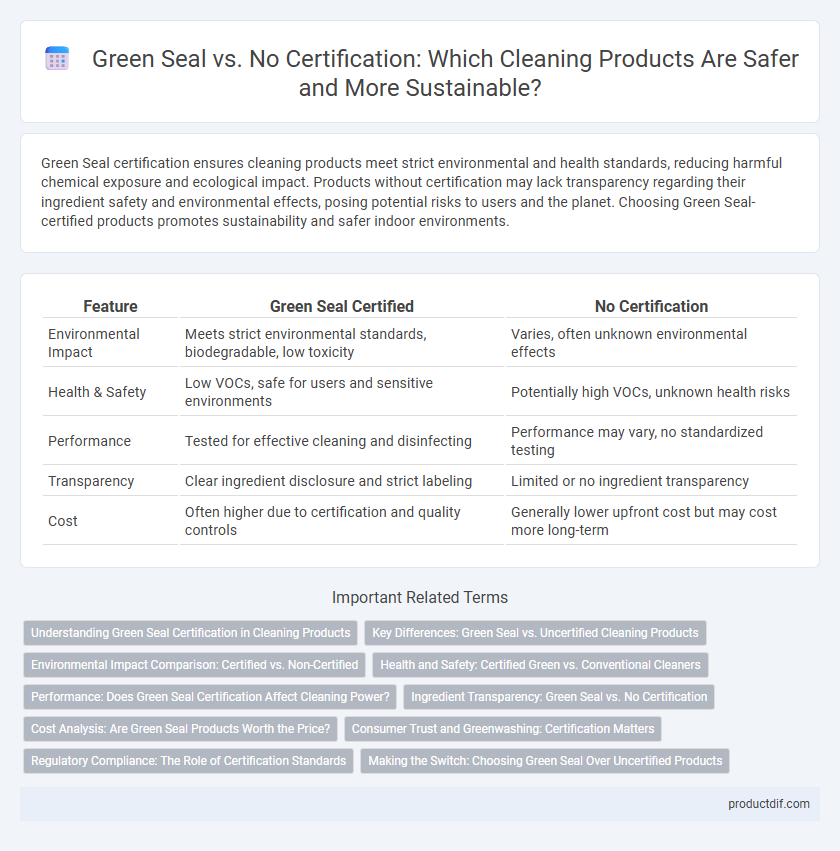Green Seal certification ensures cleaning products meet strict environmental and health standards, reducing harmful chemical exposure and ecological impact. Products without certification may lack transparency regarding their ingredient safety and environmental effects, posing potential risks to users and the planet. Choosing Green Seal-certified products promotes sustainability and safer indoor environments.
Table of Comparison
| Feature | Green Seal Certified | No Certification |
|---|---|---|
| Environmental Impact | Meets strict environmental standards, biodegradable, low toxicity | Varies, often unknown environmental effects |
| Health & Safety | Low VOCs, safe for users and sensitive environments | Potentially high VOCs, unknown health risks |
| Performance | Tested for effective cleaning and disinfecting | Performance may vary, no standardized testing |
| Transparency | Clear ingredient disclosure and strict labeling | Limited or no ingredient transparency |
| Cost | Often higher due to certification and quality controls | Generally lower upfront cost but may cost more long-term |
Understanding Green Seal Certification in Cleaning Products
Green Seal certification in cleaning products ensures rigorous environmental and health standards, including biodegradability, reduced toxicity, and sustainable ingredient sourcing. Products without certification may lack verified eco-friendly claims, posing potential risks to indoor air quality and aquatic life. Choosing Green Seal-certified products supports safer cleaning solutions and promotes environmental stewardship.
Key Differences: Green Seal vs. Uncertified Cleaning Products
Green Seal-certified cleaning products meet stringent environmental and health standards, ensuring reduced toxicity, biodegradability, and lower VOC emissions compared to uncertified alternatives. Uncertified cleaning products often lack transparency regarding chemical ingredients, leading to higher risks of indoor air pollution and potential harm to aquatic life. Choosing Green Seal-certified products supports sustainable practices while maintaining effective cleaning performance and user safety.
Environmental Impact Comparison: Certified vs. Non-Certified
Green Seal-certified cleaning products significantly reduce environmental impact by meeting rigorous standards for sustainability, biodegradability, and reduced toxic emissions. Non-certified products often contain harsh chemicals that contribute to air and water pollution, harming ecosystems and human health. Choosing Green Seal products supports environmental protection by minimizing hazardous waste and conserving natural resources.
Health and Safety: Certified Green vs. Conventional Cleaners
Green Seal-certified cleaning products undergo rigorous testing to ensure low toxicity, reduced allergens, and minimal impact on indoor air quality, significantly enhancing health and safety compared to conventional cleaners. Products without certification often contain harsher chemicals, increasing risks of respiratory issues, skin irritation, and environmental harm. Choosing Green Seal-certified options supports safer environments by prioritizing human health and ecological well-being.
Performance: Does Green Seal Certification Affect Cleaning Power?
Green Seal certification sets strict standards to ensure cleaning products deliver effective performance while maintaining environmental safety, often resulting in comparable or superior cleaning power compared to uncertified products. Products without certification may lack standardized evaluation, leading to inconsistent effectiveness and potential use of harsher chemicals. Choosing Green Seal-certified cleaners guarantees a balance of strong cleaning performance and reduced environmental impact.
Ingredient Transparency: Green Seal vs. No Certification
Green Seal certification ensures rigorous ingredient transparency by requiring products to disclose all ingredients, promoting safer and more environmentally friendly formulations. Products without certification often lack comprehensive ingredient disclosure, making it difficult for consumers to assess potential health or environmental impacts. Transparent labeling under Green Seal helps consumers make informed decisions by prioritizing non-toxic, biodegradable substances.
Cost Analysis: Are Green Seal Products Worth the Price?
Green Seal-certified cleaning products often have a higher upfront cost compared to non-certified alternatives but offer long-term savings through reduced health risks and environmental impact. Their formulation prioritizes biodegradability and lower toxicity, potentially decreasing expenses related to health care and regulatory compliance. Considering lifecycle cost analysis, Green Seal products provide superior value by balancing price with sustainability and safety benefits.
Consumer Trust and Greenwashing: Certification Matters
Green Seal certification provides consumers with verified environmental and health claims, enhancing trust by ensuring cleaning products meet rigorous sustainability standards. Products without certification often lack transparency, increasing the risk of greenwashing and misleading eco-friendly claims. Choosing certified products helps consumers make informed decisions and supports genuine environmental responsibility.
Regulatory Compliance: The Role of Certification Standards
Green Seal certification ensures cleaning products meet stringent regulatory compliance by adhering to environmental and health safety standards established by third-party evaluators. Products without certification lack verified adherence to these regulations, increasing the risk of non-compliance with federal and state environmental laws. Regulatory frameworks such as the EPA's Safer Choice program often recognize Green Seal, providing certified products with a competitive advantage in market acceptance and legal assurance.
Making the Switch: Choosing Green Seal Over Uncertified Products
Choosing Green Seal-certified cleaning products guarantees adherence to rigorous environmental and health standards, significantly reducing toxic chemical exposure compared to uncertified alternatives. Green Seal certification ensures products meet sustainability criteria such as biodegradability, reduced volatile organic compounds (VOCs), and safer ingredient profiles, which uncertified products often lack. Switching to Green Seal-certified cleaners supports healthier indoor air quality and minimizes environmental impact while providing effective cleaning performance.
Green seal vs No certification Infographic

 productdif.com
productdif.com